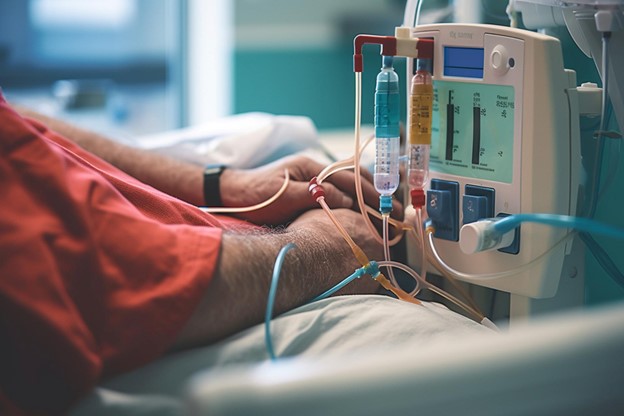Kidney disease can be life-threatening. When kidneys fail to work properly, doctors often recommend dialysis. This treatment acts like a substitute kidney, filtering a person’s blood to remove waste and excess fluids. It’s crucial for those with kidney problems because our kidneys play vital roles in our body, like filtering waste and balancing chemicals. Without this function, toxins build up, causing severe health issues.
Kidney failure means your kidneys aren’t doing their job. Dialysis treatment steps in to help. The main goal of this therapy is to mimic the work kidneys do. It does this by filtering out unwanted substances from the dialysis machine. This process, repeated a few times weekly, reduces toxic build-up and keeps people feeling healthier.
Understanding the Dialysis Process and Its Importance
Dialysis is a way to clean the blood when the kidneys can no longer do it naturally. Its primary function is to enhance and improve the life quality of people with kidney failure. It effectively removes waste and maintains important balances within the body.
There are two common types: hemodialysis and peritoneal dialysis. Hemodialysis involves a machine that takes blood from the body, cleans it, and returns it. It’s usually done in specialized centers. Peritoneal dialysis, on the other hand, uses the lining of your abdominal cavity to filter your blood.
Here’s how people manage this treatment:
- Routine Adjustments: Many adjust their daily schedules around treatment times. This might mean going to a center or managing it at home, particularly for peritoneal dialysis.
- Lifestyle Considerations: Living with this treatment can require some changes. Some might limit salt or fluid intake as a part of their dialysis diet, ensuring effective treatment sessions.
Along the way, there are many myths. Some believe dialysis treatment is painful or severely limits lifestyle, but these aren’t entirely true. The experience varies but many continue to lead fulfilling lives.
By removing waste products that accumulate when kidneys don’t work, dialysis plays a vital role in people’s lives. Understanding its importance helps dispel myths, and knowing it’s a manageable treatment can be a big relief.
Living Well with Dialysis: Balancing Treatment and Lifestyle
Adapting to dialysis is all about balance. It involves following a dialysis diet which limits certain foods. This diet reduces stress on the kidneys and supports a healthier life.
Some people face challenges like feeling tired after treatments or experiencing dialysis complications like infections or low blood pressure. But these can be managed with the help of healthcare teams.
Many find ways to thrive: – Listening to Experts: Nephrologists and technicians provide guidance. They can offer strategies for making dialysis treatment easier, like planning meals or managing rest periods. – Accessing Support: Meeting others in dialysis communities or joining online support groups can provide comfort and knowledge.
In places like India, access to dialysis varies. There’s a growing push for better healthcare access and improved treatment facilities. Awareness campaigns highlight the need for wider availability and support to those in need.
Managing daily life with dialysis is possible. With the right care and support, many lead active lives. By understanding the procedure and embracing lifestyle changes, living well with kidney failure becomes possible. Though challenges exist, positivity and perseverance can lead to fulfilling, engaging lives.
This life-saving treatment continues to offer hope, enabling many to enjoy life while managing their health challenges effectively.

